10 Dec 2020
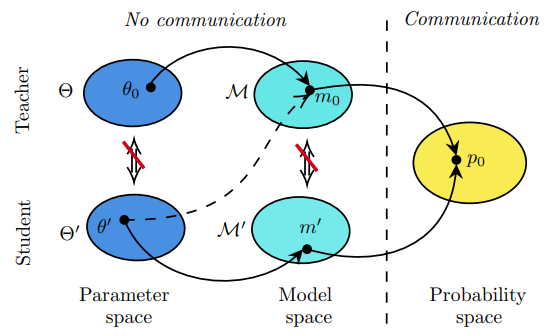
My colleague Inês Lourenço has just published
a pre-print of her latest work: Cooperative System Identification via Correctional
Learning. It has been developed in collaboration
with me, Cristian Rojas and Bo
Wahlberg.
In this work, we consider a scenario where a teacher knows a correct model of a system and
aims to assist a student who is trying to estimate it. However, the teacher cannot
directly transfer its model to the student – for example, the teacher’s knowledge might
be abstract (“what is your model of how to drive a car?”).
We propose correctional learning as an approach to this problem: in order to assist the
student, the teacher can intercept the observations collected from the system and modify
them so as to maximize the amount of information the student receives.
Have a look at the pre-print, and send Inês or me any
comments you may have!
18 Sep 2020
Our paper Inverse Filtering for Hidden Markov Models with Applications to
Counter-Adversarial Autonomous Systems has
now been published on IEEE Xplore – have a look and let us know if you have any comments!
10 Aug 2020

I am glad to announce that our paper Inverse Filtering for Hidden Markov Models with
Applications to Counter-Adversarial Autonomous
Systems (an updated version is
available in Chapter 7 of my
thesis) has been
accepted for publication in the IEEE Transactions on Signal
Processing.
In this work, we formulate and propose solutions to the problem of inverse dynamical
Bayesian inference
(filtering) for hidden
Markov models. In other words, given
a sequence of posteriors, we present
identifiability results together with a method to identify the filter’s parameters,
comprising the transition matrix of the hidden process, the matrix of observation
likelihoods as well as the sequence of measured observations y1, …,
yN.
As an application of our results, we demonstrate the design of a counter-adversarial
autonomous system: How can
we estimate the accuracy of an adversary’s sensor, based on measurements of its actions?
We believe that this paper significantly advances the toolset available to practitioners
dealing with counter-adversarial systems.
The work has been developed in collaboration with Cristian
Rojas, Vikram
Krishnamurthy and Bo
Wahlberg. We are very excited about this line of research
– let us know if you have any comments!
16 Jul 2020

I’m happy to announce that our paper How to Protect Your Privacy? A Framework for
Counter-Adversarial Decision Making has been
accepted for presentation at the 59th IEEE Conference on Decision and Control
(CDC’20).
My colleague Inês Lourenço is first author of the
paper, which has been developed in collaboration with me, Cristian
Rojas and Bo
Wahlberg. It is an extension of our recent
works that investigate counter-adversarial signal processing.
16 Jul 2020
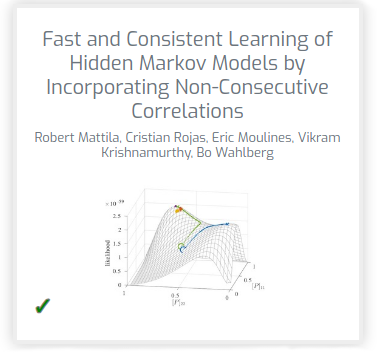
The International Conference on Machine Learning (ICML’20) is almost
over. Due to the current extraordinary global situation, the conference was fully
digital this year.
We presented our paper Fast and Consistent Learning of Hidden Markov Models by
Incorporating Non-Consecutive
Correlations
during two virtual poster sessions. Thanks everyone that “stopped by” our poster – the
discussions were very constructive!
02 Jun 2020
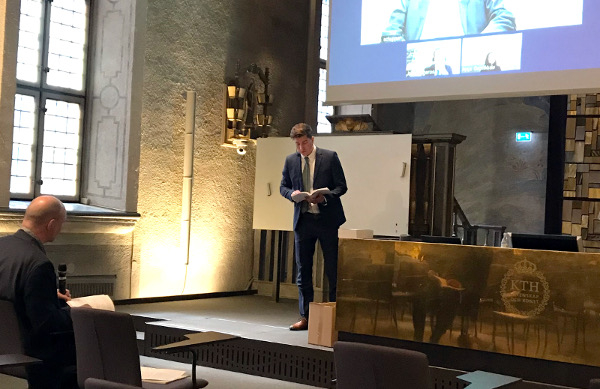
Today, I successfully defended my PhD thesis Hidden Markov Models: Identification,
Inverse Filtering and
Applications against
a committee consisting of
and was awarded my PhD degree. 😃
01 Jun 2020

I’m very happy to announce that our paper “Fast and Consistent Learning of Hidden Markov
Models by Incorporating Non-Consecutive Correlations” has been accepted for this year’s
International Conference on Machine Learning (ICML’20).
This work has been developed in collaboration with Cristian
Rojas, Eric
Moulines, Vikram
Krishnamurthy and Bo
Wahlberg.
In the paper, we study how the parameters of an
HMM can be estimated from observed data in
fast and algorithmically attractive ways. The work could benefit practitioners working
with large-scale time-series datasets (e.g., bioscience, finance, social networks, …).
A “preprint” of the paper is available in my PhD thesis (see Chapter 4) – to be defended tomorrow.
11 May 2020
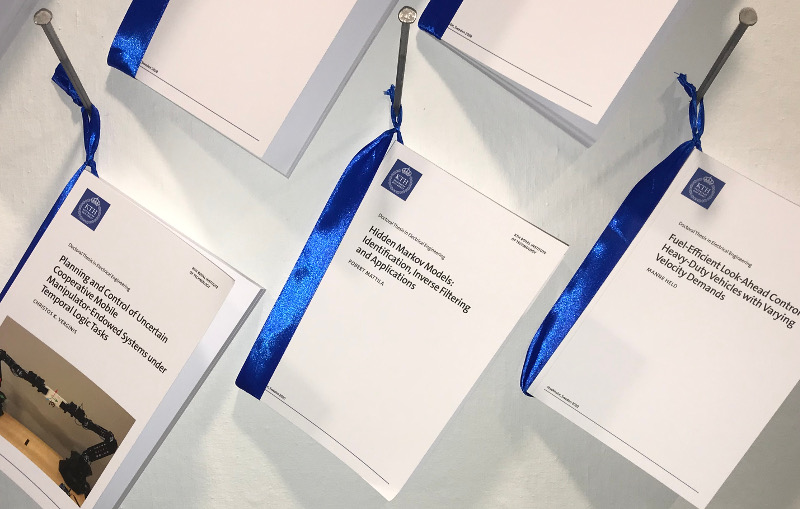
My PhD thesis Hidden Markov Models: Identification, Inverse Filtering and Applications
has been printed. If you would like a physical copy, let me know. You can download an
electronic version
here.
It will be publicly defended on the 2nd of June, with a committee consisting of
You can join via Zoom or in person (Kollegiesalen) at 09:00.
10 Apr 2020

My colleague Inês Lourenço has just published
a pre-print of her latest work: How to Protect Your Privacy? A Framework for
Counter-Adversarial Decision Making.
It has been developed in collaboration with me, Cristian
Rojas and Bo
Wahlberg. It is an extension of our recent
works that investigate counter-adversarial signal processing.
The central question asked in the paper is:
How can a decision maker select an action that
- ensures that its private belief is not exposed,
- while minimizing its cost?
Have a look, and send Inês or me any
comments you may have!
03 Feb 2020
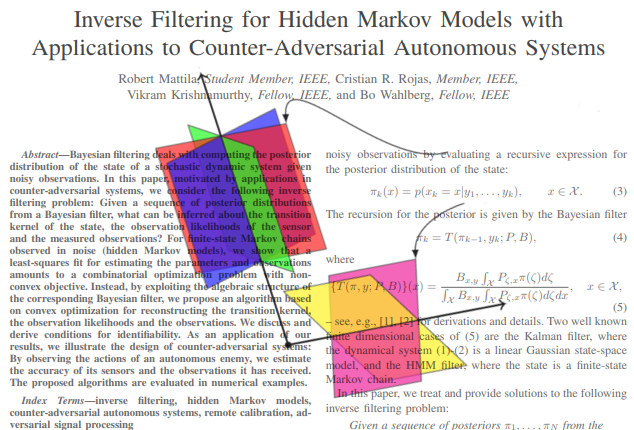
You can now find a pre-print of our latest work Inverse Filtering for Hidden Markov
Models with Applications to Counter-Adversarial Autonomous
Systems, in which we provide important extensions
to the inverse filtering algorithms proposed in our earlier NeurIPS
paper.
By observing, or intercepting, posterior distributions from a Bayesian
filter, we seek to estimate
i) the model of the dynamic system,
ii) the accuracy of the sensors and iii) the measured observations.
We also discuss the design of counter-adversarial systems. As in our ICASSP’20
paper, an enemy:
- measures our current state via a noisy
sensor,
- computes a posterior
estimate (belief) and
- takes an
action that we can observe.
Based on observations of the enemy’s actions and knowledge of our own state sequence, we
estimate the accuracy of the enemy’s sensors.
Have a look, and feel free to send me any comments you may have by email!
This is a personal web page. Opinions expressed are solely my own and do not express the views or opinions of my employer.









